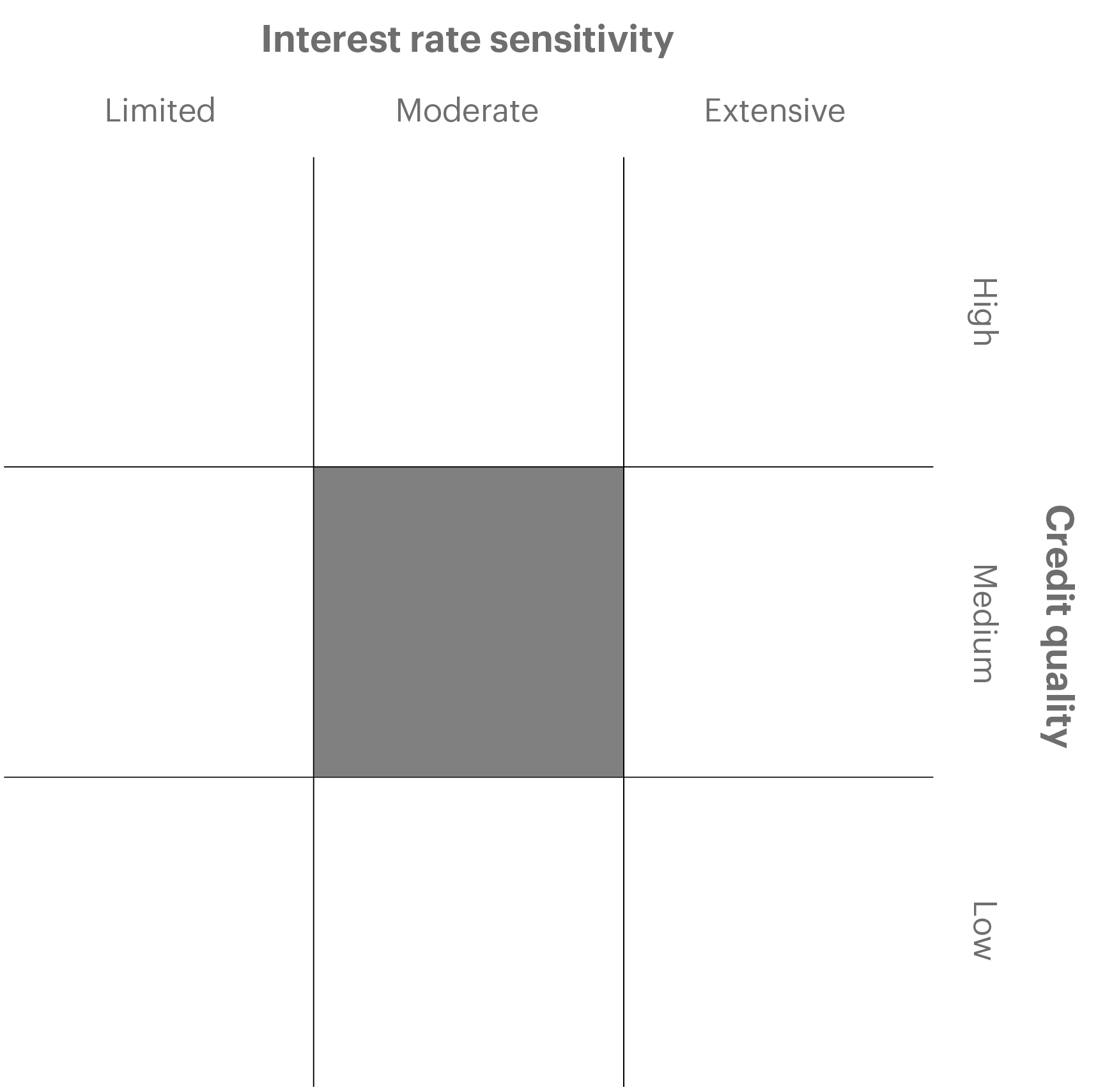Average annual returns
Average annual returns
(as of 11/30/2025)|
1M
|
3M
|
YTD
|
1Y
|
3Y
|
5Y
|
10Y
|
Inception
|
|
|---|---|---|---|---|---|---|---|---|
|
Fund
|
0.56
|
2.27
|
7.54
|
5.94
|
5.45
|
0.54
|
3.32
|
4.43
|
|
Bloomberg U.S. Aggregate Bond Index
|
0.62
|
2.35
|
7.46
|
5.70
|
4.56
|
-0.31
|
1.99
|
3.99
|
|
Lipper Core Plus Bond Funds
|
0.62
|
2.30
|
7.71
|
5.98
|
5.14
|
0.14
|
2.38
|
-
|
One-month, three-month and year-to-date returns are not annualized.
Figures quoted represent past performance, which is no guarantee of future results, and do not reflect taxes that a shareholder may pay on an investment in a fund. Investment return, principal value, and yields of an investment will fluctuate so that an investor's shares, when redeemed, may be worth more or less than their original cost. Current performance may be lower or higher than the performance data quoted and assumes the reinvestment of dividends and capital gains.
Net asset value (NAV) is the value of one share of the fund excluding any sales charges.
R6 Class shares are sold without a front-end sales charge or contingent deferred sales charge.
The manager has contractually committed, through 12/31/2025, to waive fees and/or reimburse expenses to the extent necessary to cap the fund's total annual fund operating expenses after fee waivers at 0.3%. Brokerage commissions, stamp duty fees, interest, taxes, acquired fund fees and expenses (if any), and extraordinary expenses are excluded from the expense cap. Prior to or after the commitment expiration date, the cap may be increased or the commitment to maintain the cap may be terminated only with the approval of the Board of Trustees. Without this cap, the fund's returns would have been lower. The expense ratio paid by an investor is the net expense ratio (the total annual fund operating expenses after fee waivers) as stated in the prospectus.
Calendar year
Calendar year
(as of 12/31/2024)|
2024
|
2023
|
2022
|
2021
|
2020
|
2019
|
2018
|
2017
|
2016
|
2015
|
|
|---|---|---|---|---|---|---|---|---|---|---|
|
Fund
|
2.41
|
6.94
|
-13.71
|
0.23
|
11.68
|
9.50
|
-0.14
|
5.78
|
5.97
|
0.29
|
|
Benchmark
|
1.25
|
5.53
|
-13.01
|
-1.54
|
7.51
|
8.72
|
0.01
|
3.54
|
-
|
-
|
|
Morningstar
|
2.37
|
6.22
|
-13.27
|
-0.67
|
8.06
|
8.94
|
-
|
-
|
-
|
-
|
Growth of $10,000
Growth of a $10,000 investment
(as of 11/30/2025)This chart shows the value of a hypothetical $10,000 investment in the fund over the specified time period up to 10 years or since its inception (for funds lacking 10-year records). The result is compared with benchmarks, which may include a broad-based market index and a peer group average or index. Market indexes do not include expenses, which are deducted from fund returns as well as mutual fund averages and indexes.
Does not include sales charges and assumes reinvestment of dividends and capital gains. If sales charges were included, returns would be lower.
Performance and volatility metrics
Performance and volatility metrics
(as of 11/30/2025)| 3 Year | 5 Year | 10 Year | |
|---|---|---|---|
| Alpha | 0.82 | 0.84 | 1.30 |
| Beta | 1.01 | 1.00 | 1.00 |
| Excess Return | 0.89 | 0.84 | 1.33 |
| Information Ratio | 1.30 | 0.93 | 0.80 |
| Sharpe Ratio | 0.07 | -0.42 | 0.21 |
| R2 | 0.99 | 0.98 | 0.90 |
| Tracking Error | 0.68 | 0.91 | 1.66 |
| Standard Deviation | 6.07 | 6.36 | 5.31 |
| Upside Market Capture Ratio | 103.04 | 103.47 | 118.58 |
| Downside Market Capture Ratio | 91.62 | 94.41 | 95.04 |
Morningstar ratings and rankings
Morningstar ratings and rankings
(as of 11/30/2025)The Overall Morningstar Rating for a fund is derived from a weighted-average of the performance figures associated with its three-, five- and ten-year (if applicable) ratings.
Morningstar rankings represent a fund's total return rank relative to all funds that have the same category. The percentile ranking is based on the fund's total return percentile rank relative to all funds that have the same category for the same time period. The highest (most favorable) percentile rank is 1% and the lowest (least favorable) percentile rank is 100%. Morningstar rankings do not include the effect of sales charges. The absolute ranking is based on the fund’s total return rank relative to all funds that have the same category for the same time period. Past performance is no guarantee of future results.






